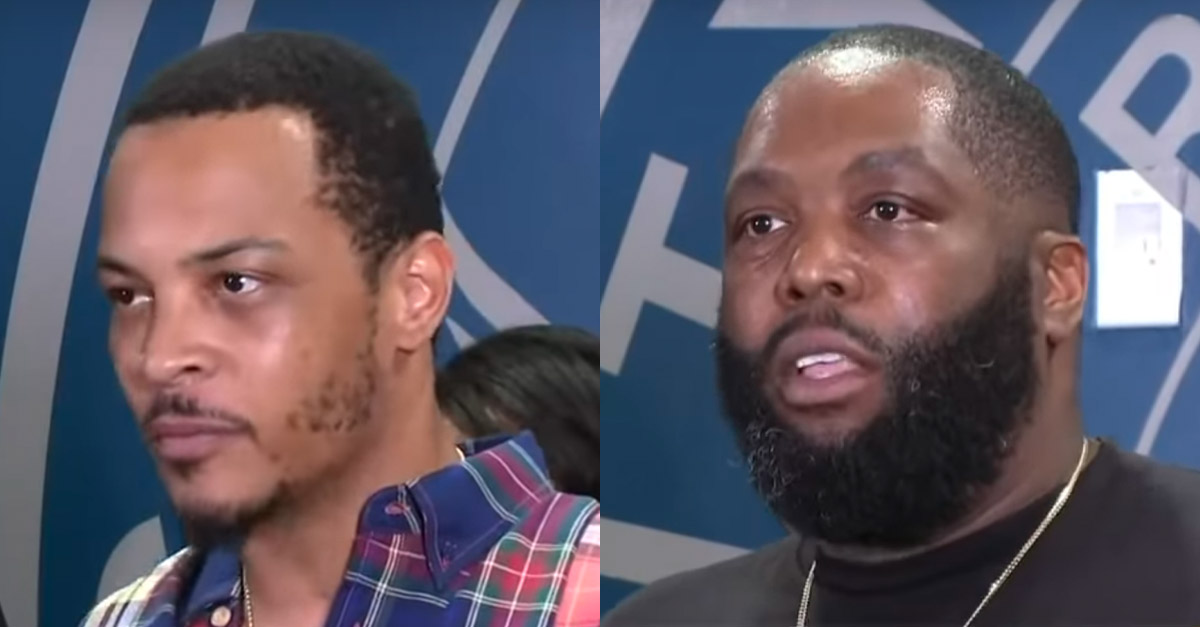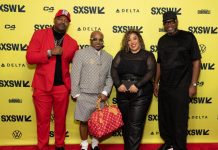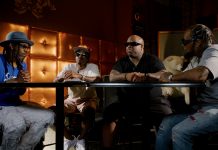
Screenshots of 11 Alive video
On Saturday afternoon, as Atlanta navigated its second night of protests in response to the deaths of George Floyd, Ahmaud Arbery, Breonna Taylor, and others to police brutality, producer and artist The Dream took to Twitter to share a message with looters. “IF YOU ARE NOT FROM ATLANTA, DONT COME HERE AND PLEASE GO HOME. I OWN THINGS IN THIS CITY, A LOT OF BLACKS OWN THINGS IN THIS CITY, FROM BANKHEAD TO BUCKHEAD,” he wrote. “DO NOT DESTROY PROPERTY THAT NEGATES THE DECADES OF WORK. MY CHILDREN WILL NOT BE SET BACK BY YOU!”
The series of tweets garnered immediate backlash, with critics accusing the artist of caring more about property than the human suffering that led to the protests and looting. “Look at this multi millionaire telling us WE need to worry about his kids fortunes,” one Twitter user responded. “Every day these celebs prove just how completely out of touch they are.”
Amid a week of protests in all 50 states and around the world, the responses from Atlanta’s rich and famous have received mixed reviews, in some cases highlighting a class divide that has long existed among Black residents. For some, Atlanta is Wakanda—as T.I. put it during Mayor Keisha Lance Bottoms’s Friday night press conference—a real-life version of the fictional Black Panther mecca where Black people govern, run businesses, and thrive among one another. For other Black Atlantans, the rapidly gentrifying city is a reminder that economic goals often overshadow the suffering of vulnerable communities.
The Dream insists his tweets weren’t just about his own investments, but there is an inherent conflict of interest in his and other artists’ statements. While it’s certainly possible to both empathize with protesters and feel pained to see the city in chaos, these artists also benefit financially from encouraging peace. As entrepreneurs and longtime ambassadors of a city that is a hub for Black businesses, their economic success and the continued growth of Atlanta are indisputably linked. Even if they came from the Black working class and genuinely wish to advocate for them, refusing to acknowledge this reality dilutes their messages.
The Twitter dialogue and other recent critiques of local celebrities illuminates the absurdity of the expectation that Black celebrities serve as the voice of all Black people. Even in a city as Black as Atlanta, Black success isn’t guaranteed. This might help explain why some locals weren’t swayed by Mayor Bottoms’s assertion that T.I. and Killer Mike “own half the west side” as she asked protesters to stop damaging and looting property downtown on Friday while standing alongside both rappers.
In a recent Atlanta Journal-Constitution article, reporters Ernie Suggs and Rosalind Bentley write, “despite Atlanta being celebrated for decades as a ‘Black Mecca,’ the city’s jobless rates were 11.5 percent for Black residents and 2.5 percent for white residents as recently as 2017, according to the Brookings Institution. The wealth gap also remains huge.”
Last year, Bloomberg ranked Atlanta as the “capital of U.S. inequality” for the second year in a row. “Headlines highlighting the city’s exceptional inequality are almost an annual tradition,” reporter Stephanie Stokes accurately pointed out in this 2018 WABE article about the most recent rankings from the Brookings Institute. While David Sjoquist, a professor in Georgia State University’s Fiscal Research Center, told WABE at the time that those rankings improve if you take the full Atlanta metro area into account, rather than just the city limits, he also said Atlanta had “one of the smallest middle classes among the 50 U.S. cities studied in the Brookings report.” He cited racism as a reason for this, noting the fact that many white families left the city when Atlanta integrated its public schools and the Fair Housing Act banned discriminatory housing policies in the 1960s.
• • •
Where traditional media has mostly covered only the crime in Atlanta’s impoverished neighborhoods, our hip-hop artists have long given voices to the voiceless, documenting stories of their triumph as well as their pain. In the mid-90s, as Atlanta was preparing for the Summer Olympics, music by rap groups including Outkast and Goodie Mob spoke to Black residents who didn’t benefit from what Maurice Hobson, a Georgia State University professor and author of The Legend of the Black Mecca: Politics and Class in the Making of Modern Atlanta, calls the city’s “Olympification.”
Poor populations are often negatively impacted by Olympic bids, and as WBUR reported in this 2016 story on Olympic displacement, “thousands of Atlanta’s poorest residents were issued one-way bus tickets to the cities where they had relatives. They had to sign papers promising they wouldn’t return. Some 9,000 poor Atlantans were arrested during the 18 months before the opening ceremonies.” The homeless population weren’t the only people affected, however. WBUR notes “the neighborhood of Summerhill was sacrificed for the construction of the Olympic Stadium, which was to become the home of the Atlanta Braves.” Residents were also displaced from the demolition of the Techwood housing projects.
While city officials worked with Black and white business communities to prepare the city for the global spotlight of the games, Goodie Mob expressed the frustration of the Black working class on their 1995 landmark album Soul Food. “Crooked [expletive] Jackson, got the whole country thinking that my city is the big lick for ’96,” Big Gipp rapped on “Git Up, Git Out.”
“Goodie Mob’s earlier discography is a reflection of centering working class Black Atlanta in ways that were overshadowed by the larger story being supported by city government,” says Dr. Regina Bradley, Kennesaw State University professor, hip-hop historian, and co-host of WABE’s Bottom of the Map podcast.
In the years since, artists from T.I. to 21 Savage have continued to speak for locals who weren’t benefiting from the city’s status as a Black Mecca. But, with stardom and increased success, some of these musicians have also aligned with the same groups they previously criticized. “T.I. is right. Atlanta has been Wakanda to many and hip-hop has def amplified that Black Mecca mythology,” Rodney Carmichael, NPR’s Atlanta-based hip-hop reporter, tweeted. “BUT its also home of the TRAP—the genre pioneered by T.I. that gave a mic to ‘the least of these’ and popularized a dominant counter-narrative to our promised land propaganda.”
Some critics on social media highlighted the contradictions between some of Killer Mike’s lyrics about police and the largely praised speech he gave during last week’s press conference where, standing alongside Atlanta Police Department Chief Erika Shields, he shouted out the police officers in his own family. A few days later, the rapper put together a press call in hopes of introducing reporters to activists who might otherwise go unrecognized. It was his way of using his celebrity to uplift grassroots activists including Judith Browne Dianis of racial justice and civil rights organization Advancement Project, Pastor Michael McBride of Black Church PAC and Live Free gun violence prevention campaign, and Nse Ufot of the Stacey Abrams-founded New Georgia Project, a nonpartisan organization that focuses on voter registration and civic engagement through technology, gaming, and pop culture.
As Killer Mike pointed out on the call, he’s been involved in activism since he was a teenager. His Edgewood Avenue barbershop, SWAG Shop, acts as a community hub where he’s previously interviewed Senator Bernie Sanders and given free back-to-school haircuts to kids. When asked for comment regarding the critiques he’d received for standing alongside the mayor and police chief, Killer Mike’s answer was simple: “No. It’s not productive to respond to criticism.” But, those critiques, he said, only make him “get better and come back, and be informed by the people actually doing the work.”
• • •
Increasingly this year, public figures—much like businesses—have struggled to strike the right tone in the midst of a global pandemic and, more recently, civil unrest as a result of police brutality. And many young fans aren’t shy about expressing their outrage when this happens. For some, there’s an expectation for the celebs they support to be knowledgeable and vocal participants in the social justice causes that matter most to them. But, for others, it seems silly to expect all pop culture figures to speak out and be experts on these topics. Not everyone wants to be an activist.
Regardless, if Atlanta’s hip-hop stars truly want to participate in community activism, they’ll have to reckon with their own status as members of the wealthy elite.
“Something I have been thinking about is the commercialization of the ‘gate’ and who gets to keep it,” Bradley says. “If you are a multimillionaire artist, do you still get to be the litmus test for working class communities that propelled you to economic success and popularity? What is the line? Money blurs so many lines and plans of action.”













